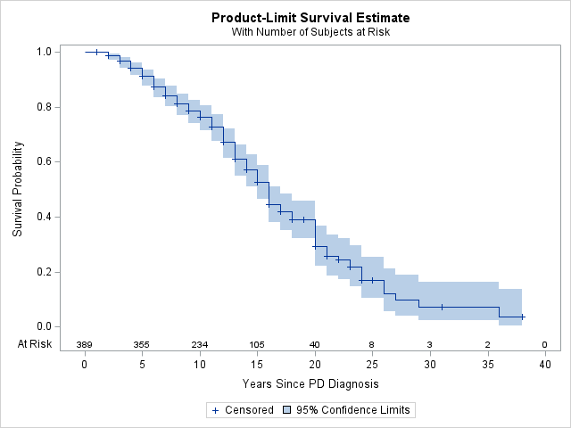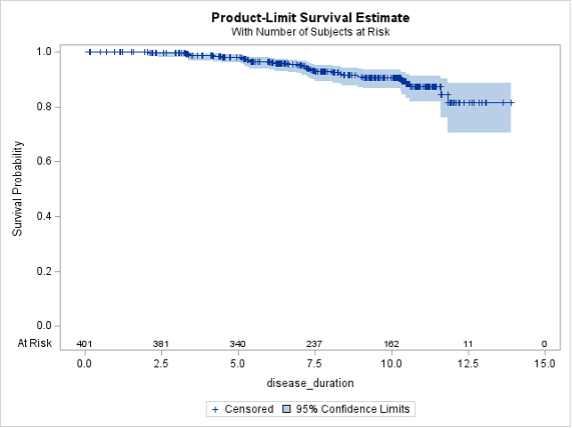Category: Parkinson's Disease: Cognitive functions
Objective: To determine long-term, cumulative dementia prevalence rates in Parkinson disease (PD) using data from two large, ongoing, prospective observational studies.
Background: Dementia is reported to occur in up to 80% of PD patients long-term, but studies reporting such high rates were published years ago, and had relatively small sample sizes and other limitations.
Method: Data from two ongoing studies were analyzed: (1) Parkinson’s Progression Markers Initiative (PPMI) and (2) a longstanding PD research clinical core at the University of Pennsylvania (Penn). PPMI enrolled de novo, untreated PD participants at baseline, administers a cognitive battery and MDS-UPDRS Part I annually, and the site investigator follows guidelines and assigns a cognitive diagnosis annually. The Penn clinical core enrolls a convenience sample of PD patients from a PD clinical center and administers a comprehensive cognitive battery either annually or biennially, and a cognitive diagnosis is made at each research visit by expert consensus. Kaplan-Meier (KM) survival curves were fit for time from PD diagnosis to stable dementia diagnosis (i.e., no reversion from dementia to non-dementia) for each cohort, using site investigator cognitive diagnosis as the primary endpoint (for both PPMI and Penn), and MoCAscore <21 and MDS-UPDRS Part I cognition score ≥3 as secondary endpoints (for PPMI).Participants who did not receive a dementia diagnosis were censored at their last follow-up visit. In addition, cumulative dementia prevalence by year of PD disease duration were tabulated for each study and endpoint.
Results: For the PPMI cohort, 417 PD participants were seen at baseline; estimated cumulative probability of dementia at year 10 disease duration were: 9% (site investigator diagnosis), 13% (MoCA) or 10% (MDS-UPDRS Part I cognition). For the Penn cohort, 389 PD participants were followed over time, with 184 participants (47% of cohort) eventually diagnosed with dementia. The KM curve for the Penn cohort had median time to dementia diagnosis =16 years (95% CI: 15-17) disease duration; the estimated cumulative probability of dementia was 24% at year 10, 47% at year 15, and 71% at year 20.
Conclusion: Results from two large, ongoing, prospective studies suggest that dementia in Parkinson disease occurs less frequently, and later in the disease course, than oft-cited previous research studies have reported.
To cite this abstract in AMA style:
J. Gallagher, J. Fedler, C. Gochanour, R. Dobkin, D. Aarsland, R. Alcalay, M. Barrett, C. Caspell-Garcia, R. Cho, L. Chahine, A. Chen-Plotkin, C. Coffey, N. Dahodwala, J. Eberling, A. Espay, J. Leverenz, I. Litvan, E. Mamikonyan, J. Morley, I. Richard, L. Rosenthal, A. Siderowf, T. Simuni, M. York, A. Willis, S. Xie, D. Weintraub. Long-term dementia prevalence in Parkinson disease: Glass half-full? [abstract]. Mov Disord. 2023; 38 (suppl 1). https://www.mdsabstracts.org/abstract/long-term-dementia-prevalence-in-parkinson-disease-glass-half-full/. Accessed February 9, 2026.« Back to 2023 International Congress
MDS Abstracts - https://www.mdsabstracts.org/abstract/long-term-dementia-prevalence-in-parkinson-disease-glass-half-full/




